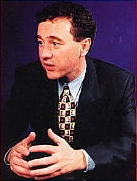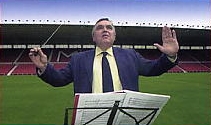| DAVID GOLIGHTLY | David studied composition with Richard Steinitz at Huddersfield
University. Born in Co Durham and now based
in Cheshire, a number of his compositions have been commissioned
by eminent performers, including “Moods” for Roger
Heaton, “Rites of Passage” and “The St
Petersburg Mass” for The Roussland Soglasie Male Voice
Choir of St Petersburg. In addition, David has
composed prolifically for theatre and film. The most notable
credits include “Blue Remembered Hills”, “On the Razzle”, “The
Glass Menagerie”, “Cider with Rosie” and “Under
Milkwood” (Theatre), “Out of the Depth” and “I’m
no Angel” (Film). David has had his concert music performed as far afield as America, Germany, Poland and Russia. He now combines a hectic freelance career, working as a commercial orchestrator, with that of a classical composer and conductor. To add to his credits, David was also acclaimed for his arrangements for the Latvian opera singer Inessa Galante on her CD “Arietta”. A number of David’s compositions will be premiered later in the year 2000-2001. These include a performance of his piano sonata by Jessie de Bellis at Carnegie Hall, New York, (Dec. 21st 2000) and at the Jacqueline du Pre Theatre in Oxford (Jan. 13th 2001). Important premieres scheduled for Russia in the year 2001 include the “First Symphony”. Much of David’s serious music is recorded and available from CD retail outlets. In 2001, two further CDs of David’s music are scheduled for release. David was chairman of “The North-West Composers’ Association” and,
at the moment, is a director of the newly
formed British Academy. In addition, he is also one of the
classical representatives for the “PRS Advisory Group” established
to assist the company review its public performance
and broadcast policy. |
|
|
GAVIN SUTHERLAND Music for dance has played a very important part in Gavin’s career. In 1992, he began working with Northern Ballet Theatre, first as a pianist then as a staff conductor. He moved on from NBT in 1998 to pursue freelance activities, based in London. On the basis of his first CD, the critically acclaimed “British Light Music Discoveries”, Gavin began a healthy relationship with the Royal Ballet Sinfonia in their roles on the concert platform, in the recording studio and in their role as the orchestra of Birmingham Royal Ballet, appearing with them both here and abroad. His recording work has also taken him to Prague, where he has recorded many CDs with the City of Prague Philharmonic Orchestra, including “The Carry On Album” which went straight into the charts. Gavin has also appeared as a guest conductor for English National Ballet, Atlanta Ballet, Adventures in Motion Pictures, and, most recently, a full-house tour of “Dracula” with the Royal New Zealand Ballet, appearing in New Zealand and Melbourne. He has also guest conducted the RTE Concert Orchestra, the Wellington Sinfonia, the Auckland Philharmonia and the Australian Philharmonic Orchestra amongst others. He recently took up the role as conductor of the Capriol Chamber Orchestra, and has taught at Cheltenham Ladies’ College. Gavin’s compositions and arrangements are played all over the world. Two of the most recent successes were his new arrangement of “Giselle” for the Norwegian National Ballet and his musical “Little Women”, which premiered in London in July this year. Future plans include work for BBC Television, further conducting with ENB, AMP and the Australian Pops Orchestra, more recording work in both London and Prague, as well as another tour of New Zealand with RNZB. |
|
| SYMPHONY NUMBER 1 The first symphony was composed over a period of four
years in between the various distractions of teaching,
arranging and orchestration, all very necessary to survive the financial
demands of our modern society. The creation of the
symphony has been difficult. Always there in the
background, it has demanded my attention when tiredness and worldly problems
have sapped my energy.
Its completion has drained my resources and eroded my self confidence. Yet the dream of it remains, Is my talent strong enough to reach out, whatever the style, whoever the audience? Will the listener see the vision woven into the very fabric of the music, and, more importantly, will that vision touch their own dreams? The work is dedicated to, and inspired by,Steve Gibson, the players and staff of Middlesbrough Football Club. The work reflects the club’s history over the last five years with the scherzo portraying the optimism of the visits to Wembley, the slow moment reflecting the pain of defeat and the break-up of what could have been a great team. The final movement, with its march, tries to capture the atmosphere of a typical match day, with the excitement and the two halves of the game built into the structure of the music. There is even a section for the football pundits to analyse the day’s activities and a section for the arrival of the teams on the pitch. The large orchestral fanfares depicting the home team scoring. However, the work is more than just a dedication to one mans vision, It is a tribute to all the Steve Gibson's of this world where-ever they exist. The builders, the dreamers, the workers, the givers, who strive to better our existence, no matter the cost or the struggle. In a world full of avarice and greed, they still exist. Some make large visual contributions, some small gestures, all of equal value to the melting pot of humanity. The symphony was born out of a desire to redress the cruelty of fate with regards to the 1996-1 997 season, but I hope it has become something more, a tribute to the quality of the individual. |
|
| Dedicated to Steve Gibson, “We are the sum total of the lives we touch” “A small gift from a grateful supporter” David Golightly |
|
| Steve Gibson | |
 |
‘The best Chairman in the League” -
Bryan Robson Steve Gibson is Middlesbrough Football Club” - Gary Pallister ‘ Without Steve’s vision and dreams, none of this would exist” - Colin Cooper ‘ Steve won’t be satisfied until Middlesbrough are not only a top Premiership side but also a top European side - his ambition is tremendous” - Robbie Mustoe |
| Born and raised in the Park End
area of Middlesbrough, Steve Gibson is a lifelong Boro fan
who once dreamed of playing for his local football club. Instead,
he became its chairman and owner.
In 1984, Gibson became Middlesbrough Football Club’s youngest ever director when, at the invitation of then chairman Mike McCullagh, he joined the board aged just 26. Two years later, he formed the consortium that saved the club from liquidation. A decade after joining the club’s board of directors, he somewhat reluctantly succeeded Colin Henderson as Chairman of the club. It was his vision that saw Boro leave Ayresome Park, their home for the previous 92 years, for the new all-seater Riverside Stadium in 1995. A year earlier, his appointment of former England captain Bryan Robson as manager kicked off the Riverside Revolution which saw Boro reach three Wembly cup finals within 12 months and bring some of the world’s biggest stars to Teesside. Now the owner of the vast majority of the club’s shares, Gibson’s dream is to establish Boro not only as a Premier League force but as a regular player on the European stage. A self-made businessman, Gibson is the Managing Director of chemical haulage company Bulkhaul. Now one of the UK’s top 10 private companies, Bulkhaul was started by Gibson after he borrowed £1000 from his father. Gibson is married to Vicky and they have one daughter, Katie |
|
Reviews The Eye (Chamber Opera) “His well-crafted score is taut and often very
attractive” “The highlight of
the production was undoubtedly the vibrant score” The St. Petersburg Mass “It is a work of great talent” “Music of stunning orchestral
virtuosity and emotional depth” “It is Music of the Heart” “According to the great composer Mussorgsky, ‘Of
greatest importance for a composer is his
search for truth’; it Is this truth we hear when
we perform David Golightly’s music” “The
Englishman with a Russian soul” |
|
Credits
Recorded 28-30.8.00. by the City of Prague Philharmonic Orchestra.
Engineer Anthony Askew.
Editing and mastering Richard Scott and David Ellis.
Produced by Philip Lane.
Executive producer Stephen Plews.
Sleeve Design and Layout by ASO Design.
